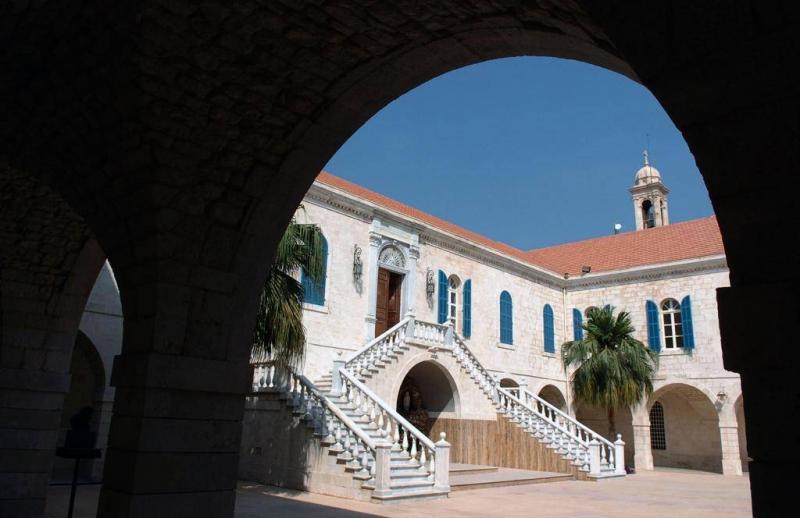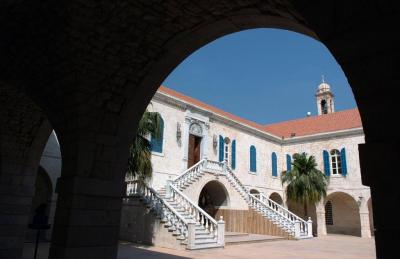A lot has been said in the newspapers and media about the Patriarch's upcoming steps, his sending of envoys to political forces, meetings to be held in Bkerke, an escalation in his Sunday sermon calling for the opening of parliament doors, and parallel communications being undertaken by the Vatican and France with local and foreign parties. Analyses and interpretations have also emerged regarding the Patriarch’s meetings in the two European capitals, ranging from positive to negative perspectives.
Shortly after Maronite Patriarch Bechara Raï returned from the Vatican and Paris, he announced new initiatives urgently aimed at breaking the political deadlock concerning the presidential file. In a series of statements before a delegation from the Press Syndicate, he noted that "the Vatican and France asked me to work internally with the other components, and we will talk with everyone without exception, even with Hezbollah, and the movement will start today (Thursday). During my tour, I sensed a comfort level regarding Christian consensus on a presidential candidate," stressing that “Speaker Nabih Berri should call for a session two months before the president's term ends, but we uniquely oppose the constitution.”
The Patriarch is closely following the presidential issue, communicating with everyone, and trying to persuade all parties about the need for a unified understanding centered on agreeing to conduct presidential elections. Almost immediately, Berri responded by stating that he "will not close the parliament, but he will not call for an election session before at least two serious nominations appear." Meanwhile, Jaafari Mufti Ahmad Qabalan responded to the Patriarch by saying, "We are partners in the nation and makers of sovereignty and protectors of the state and the country, not slaves. Lebanon is made in Lebanon, not on a plane; national sovereignty is at the gates of the parliament, not in airborne papers, and Lebanese history is witness."
In any case, it is clear that the Patriarch's positions come as a result of French and Vatican support for his efforts on the presidential file, whether from French President Emmanuel Macron or Vatican Secretary of State Cardinal Pietro Parolin. Information indicated that the Vatican intervened with the French side, playing a role in bridging views between Raï and Macron, especially regarding the presidential election, with Macron appearing cooperative and understanding the Patriarch's concerns and perspective on the presidential matter and the overall Lebanese situation.
These positive atmospheres were confirmed by an Elysee statement indicating that the French president expressed support for the efforts made by the head of the Maronite Church to extract Lebanon from the "political impasse," urging all forces in the crisis-laden country to elect a president "without delay."
At the same time, there has been an increase in positivity regarding the recent presidential consensus between the opposition and the "Free Patriotic Movement." Representatives of interested blocs, along with some change and independent MPs, are nearing an announcement for the candidacy of former Minister Jihad Azour, indicating that matters are beginning to mature and will not take much longer, according to one opposition MP who spoke to "Wardna," stating, "We have completed the process of agreeing on a centrist name, and the official announcement will be made in the next two days. We are in continuous meetings to reach a final decision on some details related to the mechanism and timing."
In this context, representatives from the "Strong Republic" bloc, "the Kataeb," "the Renewal," and several change MPs held a meeting to develop appropriate mechanisms that would lead to formulating a presidential agreement among themselves and other blocs that intersected on agreeing on a common presidential candidate.
Away from "media noise, interpretations, and analyses," it is necessary to return to the source, which is the Maronite Church, and to a concerned and very informed party in Bkerke that speaks about "constants" and facts as they are, without distortion. It is certain that the movements intended by the Patriarch are not yet clear and have not crystallized into a specific format; he might either contact all involved personally or send envoys on his behalf, but what is important is that he will attempt to engage with everyone. It is undoubtedly necessary to reconsider the general situation in Lebanon and to draw up a clear action plan and a rescue proposal for the country, but this will not happen all at once or at the push of a button; rather, it requires the fundamental structure of the state to be present.
Thus, there is a pressing insistence, above all else, on electing a president to reconstitute the state's structure anew with individuals capable of working together and who have the means to save the nation. This requires broad consensus around the presidential candidate, not because he alone will act, but rather because he cannot achieve any reform without cooperation from all parties. It is a "very important national workshop that requires the sincere, honest, and loving collaboration of everyone for the nation's sake, with a true desire for reform to return the country to the right path for the benefit of all Lebanese, not just a certain faction."
The informed ecclesiastical source close to the Patriarch's moves stated that the Patriarch is closely monitoring the presidential file, contacting everyone, and encouraging all parties to unite on the idea of the necessity to agree on conducting presidential elections as soon as possible; this is the primary goal. The head of the Maronite Church is fathering for the people and the nation, hoping to reach a solution. Undoubtedly, "President Berri, based on his national sensibility and great experience, knows that there are not enough data to open the doors of the parliament," and it is still unclear if a final agreement exists among Christians regarding a name; matters are still being discussed, and a stage has not yet been reached that reassures the Patriarch that Christians have officially agreed on a name.
If an official announcement is made regarding this name, "then President Berri will not need anyone to call him to open the parliament and hold an election session since he states that when we have candidates, I will invite to a session." Formalities, means of communication, and meeting locations do not matter; what is crucial is to save the sick country.
Although Patriarch Raï returned from his European tour with optimism, contentment, appreciation, and support for his actions, especially regarding the presidential file, the countries concerned with Lebanese affairs ultimately work to secure their interests, and the Patriarch has no ambitions for any role. He will play on the democratic chord, nothing more and nothing less. When we have candidates for the presidency, according to the simplest rules of democracy, we head to the parliament, and the MPs will cast their votes; whoever gets the majority wins. This democracy has been undermined for a while.
What concerns the Patriarchal edifice today is the alignment among the officials, which is seen as the core of the issue according to Bkerke. Paris has shown interest and satisfaction regarding the news about the agreement of Christian forces on a single candidate, and it awaits the final announcement so that actions can follow accordingly. If Christians reach "an agreement on a name, the Patriarch will be at ease and even more so when the president is elected." Despite his efforts to contribute to saving the country, the responsibility lies with officials and political forces to make concessions to one another and meet for the country's interest. This is "the essence of the communications that the Maronite Patriarch will undertake," according to the same source.
"Formalities, methods of communication, and meeting places do not matter; rather, what is essential is saving the sick country." The ecclesiastical source questions how long they will wait as the country falls apart. What is the basis for disagreement as the nation has emptied of its people? What are the fundamental disagreements preventing them from electing a president, forming a government, and rebuilding the state? Do they question whether their consciences are clear amid all that is happening and the deadly vacancy? Or have they died, buried under the seventh ground?




